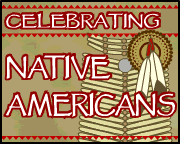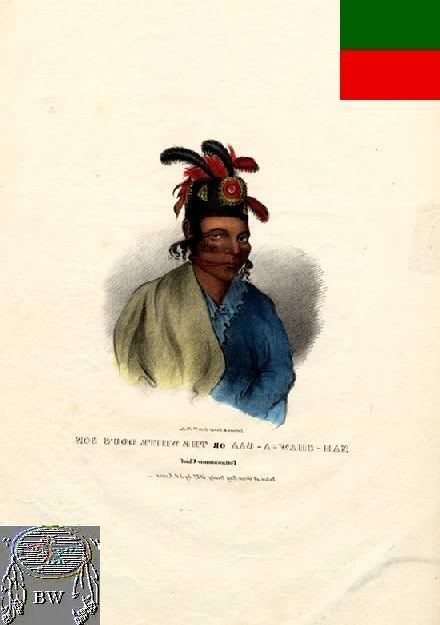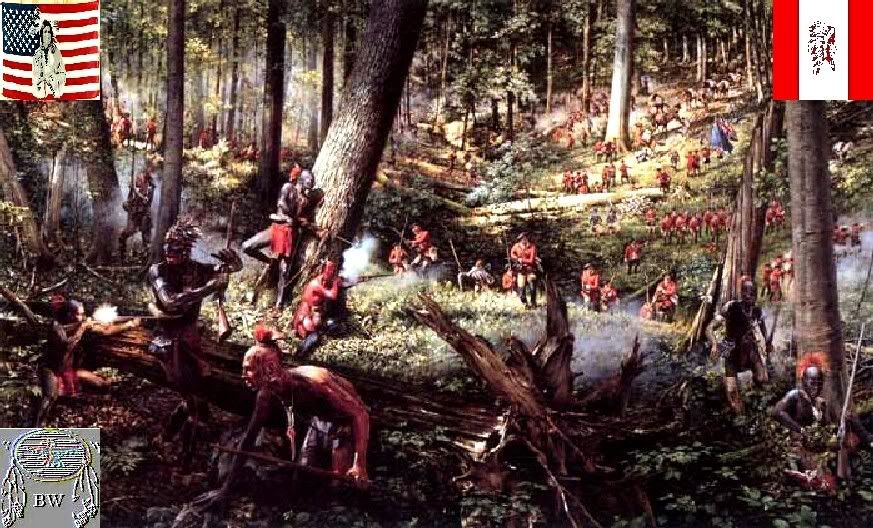|
BRAVEHORSE WARRIOR Pemoussa
Fox Warrior

 Chief Pemoussa
Warrior Citation
PEMOUSSA, great war chief of the Fox Tribe; d. during the winter of 1716–17 in Montreal. Pemoussa was one of the leaders
of the group of Fox Indians that migrated from Baie des Puants (Green Bay) to Detroit in 1709 or 1710. Lamothe Cadillac [Laumet]
had invited them to settle there although a number of other tribes disliked them. According to Rigaud de Vaudreuil, the Foxes
had moved simply to be nearer to the Iroquois and the English. After their arrival the Foxes behaved arrogantly. Fearing trouble,
Vaudreuil advised them at a meeting in August 1711 to return to their village. This advice was not heeded and war soon followed.
Chief Pemoussa
Warrior Citation
PEMOUSSA, great war chief of the Fox Tribe; d. during the winter of 1716–17 in Montreal. Pemoussa was one of the leaders
of the group of Fox Indians that migrated from Baie des Puants (Green Bay) to Detroit in 1709 or 1710. Lamothe Cadillac [Laumet]
had invited them to settle there although a number of other tribes disliked them. According to Rigaud de Vaudreuil, the Foxes
had moved simply to be nearer to the Iroquois and the English. After their arrival the Foxes behaved arrogantly. Fearing trouble,
Vaudreuil advised them at a meeting in August 1711 to return to their village. This advice was not heeded and war soon followed.
 The battle of Detroit in May 1712 marks the start of the Fox war that plagued New France for the next 25 years. Though
Renaud Dubuisson, the commander of the fort, blamed Fox restlessness on English intrigue, the fighting had its origin in the
animosities between the Mascoutens and the Ottawas who clashed on the St Joseph River early in 1712. The Mascoutens fled to
Detroit where they sought the protection of the Foxes. Under the leadership of Saguima and Makisabi, the Ottawas and Potawatomis,
accompanied by several southern tribes, pursued them but feared to attack the Foxes. The insolent Foxes quarrelled with some
of the French inhabitants and entering Fort Pontchartrain attempted to assassinate a French man and woman. Dubuisson drove
them out and joined the Ottawas and others in attacking the fortified Fox village. The battle lasted 19 days. During that
time two parleys aimed at ending hostilities were held at the request of the Foxes. At the first one, Pemoussa offered a necklace
and two slaves to appease the allies, and asked for a two-day truce so that the Fox old men could hold a council. Dubuisson
agreed on condition that three Native American women prisoners held by the Foxes were released; on their release Dubuisson
went back on his promise. Three or four days later Pemoussa led a larger group of chiefs from both the Foxes and Mascoutens
to a second parley. According to Dubuisson’s account, their spokesman (perhaps Pemoussa) acknowledged their defeat and
signified their readiness to die. They asked only that their women and children be spared and offered the allies six necklaces
to signify that they placed themselves in servitude to the victors. This gesture was refused by the allied chiefs. According
to the account of Gaspard-Joseph Chaussegros de Léry, compiled from second-hand reports, it was probably at this parley that
a Fox chief (again perhaps Pemoussa) challenged 80 allies to do battle with 20 of his own. The victor would receive the vanquished
as slaves. Apparently this offer was also refused. The Foxes and Mascoutens finally escaped from their fort under cover of
a dark, rainy night, only to be pursued and surrounded on a peninsula on Lake St Clair. Except for 150 men who escaped all
were either destroyed or enslaved. In the summer of 1716 Louis de La Porte de Louvigny led an expedition against the Foxes.
Having defeated them, he took Pemoussa and others back to Montreal as hostages. Pemoussa died there in the winter of 1716–17
in the smallpox epidemic then sweeping the colony. Apparently he had been favourable to peace between the Foxes and the French:
Vaudreuil wrote in 1717 that “it was he [Pemoussa] on whom I relied most to make the Fox Tribe carry out all the conditions
to which they are bound.” His passing may have weakened the peace party among the Foxes. From: historical accounts &
records
The battle of Detroit in May 1712 marks the start of the Fox war that plagued New France for the next 25 years. Though
Renaud Dubuisson, the commander of the fort, blamed Fox restlessness on English intrigue, the fighting had its origin in the
animosities between the Mascoutens and the Ottawas who clashed on the St Joseph River early in 1712. The Mascoutens fled to
Detroit where they sought the protection of the Foxes. Under the leadership of Saguima and Makisabi, the Ottawas and Potawatomis,
accompanied by several southern tribes, pursued them but feared to attack the Foxes. The insolent Foxes quarrelled with some
of the French inhabitants and entering Fort Pontchartrain attempted to assassinate a French man and woman. Dubuisson drove
them out and joined the Ottawas and others in attacking the fortified Fox village. The battle lasted 19 days. During that
time two parleys aimed at ending hostilities were held at the request of the Foxes. At the first one, Pemoussa offered a necklace
and two slaves to appease the allies, and asked for a two-day truce so that the Fox old men could hold a council. Dubuisson
agreed on condition that three Native American women prisoners held by the Foxes were released; on their release Dubuisson
went back on his promise. Three or four days later Pemoussa led a larger group of chiefs from both the Foxes and Mascoutens
to a second parley. According to Dubuisson’s account, their spokesman (perhaps Pemoussa) acknowledged their defeat and
signified their readiness to die. They asked only that their women and children be spared and offered the allies six necklaces
to signify that they placed themselves in servitude to the victors. This gesture was refused by the allied chiefs. According
to the account of Gaspard-Joseph Chaussegros de Léry, compiled from second-hand reports, it was probably at this parley that
a Fox chief (again perhaps Pemoussa) challenged 80 allies to do battle with 20 of his own. The victor would receive the vanquished
as slaves. Apparently this offer was also refused. The Foxes and Mascoutens finally escaped from their fort under cover of
a dark, rainy night, only to be pursued and surrounded on a peninsula on Lake St Clair. Except for 150 men who escaped all
were either destroyed or enslaved. In the summer of 1716 Louis de La Porte de Louvigny led an expedition against the Foxes.
Having defeated them, he took Pemoussa and others back to Montreal as hostages. Pemoussa died there in the winter of 1716–17
in the smallpox epidemic then sweeping the colony. Apparently he had been favourable to peace between the Foxes and the French:
Vaudreuil wrote in 1717 that “it was he [Pemoussa] on whom I relied most to make the Fox Tribe carry out all the conditions
to which they are bound.” His passing may have weakened the peace party among the Foxes. From: historical accounts &
records
|

